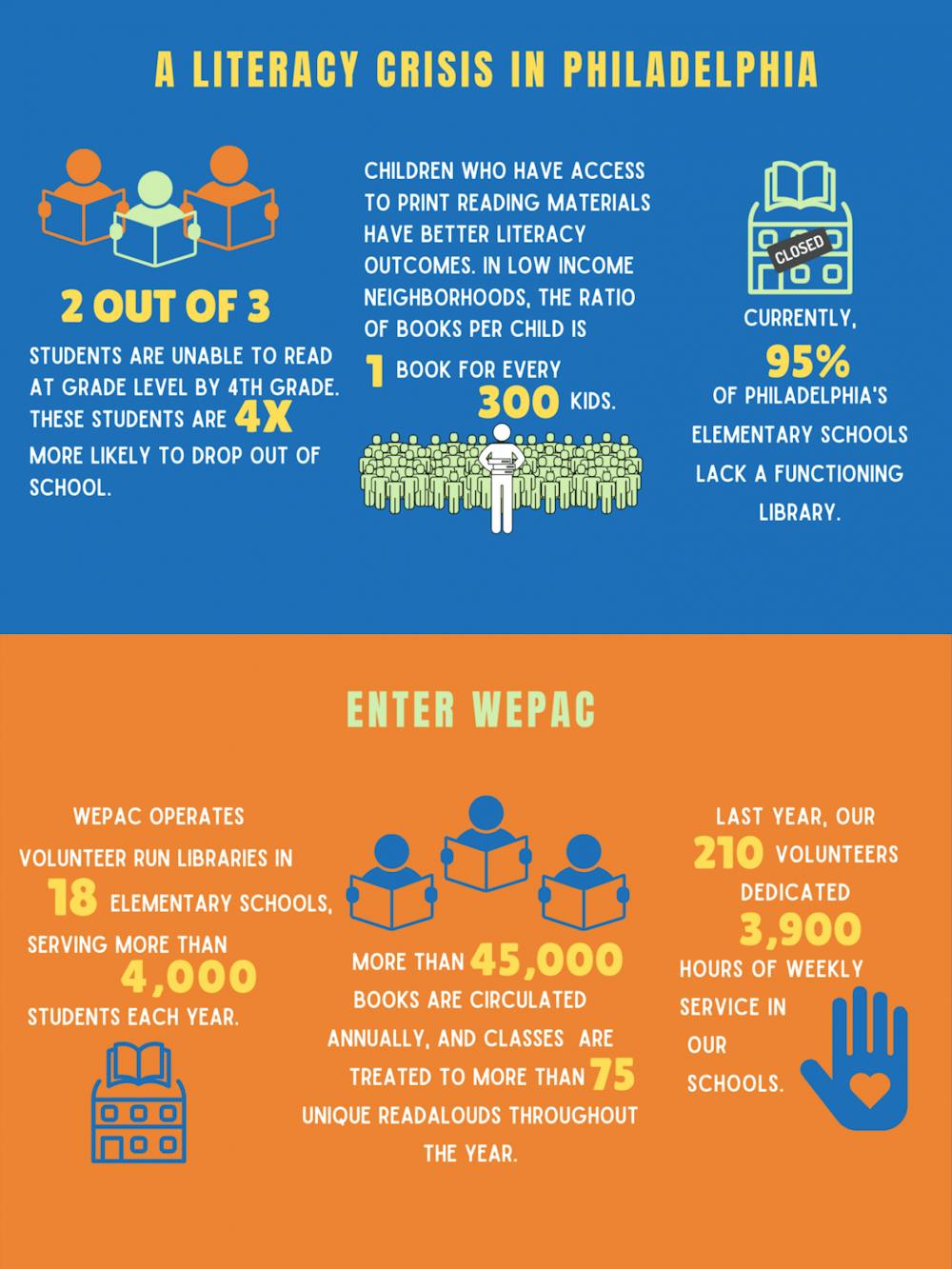
Penn Libraries and student volunteers have partnered with the West Philadelphia Alliance for Children and the School District of Philadelphia’s libraries in an effort to increase literacy among students at local public schools.
Although schools have been closed since March 31 due to the COVID-19 pandemic, WePAC, a grassroots nonprofit organization that operates volunteer-run elementary school libraries in Philadelphia, has found ways to continue its programming with Penn Libraries’ assistance.
Community Engagement Librarian at Penn Libraries Gina Pambianchi leads Penn Libraries’ local engagement efforts, including the WePAC partnership. Pambianchi and Penn work-study students remotely cataloged WePAC’s library collections this spring and are currently looking into possibilities for expanding the engagement program.
WePAC Executive Director Anisha Sinha said that because 95% of schools in the district lack functioning libraries, WePAC has been working to revive them through volunteers, including Penn students, and book donations. She said the organization currently staffs 18 libraries with over 200 volunteers.
As part of Penn's work with the school libraries, student volunteers and Penn Libraries are remotely cataloging and developing the Mirrors Program, a curriculum of books that focus on children of color and reflect the populations of schools the program serves. The engagement program aims to increase literacy rates in Philadelphia schools.
Sinha said that approximately two-thirds of students in Philadelphia enter into fourth grade unable to read at their grade level, making them less likely to graduate high school on time. An inability to read at grade level correlates with higher school dropout rates, behavioral issues, and incarceration later in life as well, according to the Free Library of Philadelphia.
“The city is really experiencing what I would call a literacy crisis, and one of the ways to promote literacy for kids is access to books,” Sinha said.

WePAC volunteer Ellen Rosen, who lives in Riepe College House with her husband, Classical Studies professor Ralph Rosen, has worked with students at Henry C. Lea Elementary in the School District of Philadelphia for about five years. Pambianchi said most Penn volunteers work at Lea because it is close to campus.
Penn WePAC volunteers help look for appropriate books for the school's library, read aloud to the students, check books in and out for students, and coordinate library programming and activities, she said.
“Our goal is to really get kids to love books and reading," Rosen said. "We’re really trying to engage them and find books that mirror their world."
Sinha said that because most children’s books center around the experiences of white children, Penn's student volunteers this summer have been designing a curriculum that incorporates books which are more reflective of the experiences of the local students they serve, many of whom are students of color.
“We always talk about books as windows, doors, and mirrors, so they are opportunities to explore new worlds, to look into new spaces, or to see yourself reflected,” Sinha said.
Pambianchi emphasized that while the University does provide funding and management support for these libraries, their work is ultimately possible because of WePAC.
“We kind of are more behind the scenes in terms of helping catalog, and then we also have 20 to 30 work-study students every year that go into a few of the schools to help with cataloging, checking books in and out to students, interacting with students, and organizing the libraries,” Pambianchi said.
WePAC’s libraries previously cataloged books on paper, but since their partnership began in 2014, Penn Libraries has paid for an electronic cataloging system called Follett Destiny Library Manager. The electronic system virtually connects the catalogues of all of the Philadelphia schools, and has sped the process of children checking books in and out with volunteers.
This summer, Penn students have been helpful in electronic cataloging and creating guides that explain the cataloging process to the other volunteers, and Sinha said she hopes more students will become involved in WePAC.
“Penn students are a very appealing demographic to an elementary school kid — they’re cool,” Sinha said. “[The children] want to talk to them, they want to be like them, and so having Penn students coming into a library space and celebrating books models a behavior that they want to emulate, which is great because it makes it fun to read and exciting to read and cool to read.”
When the pandemic hit the city in March, WePAC and Penn Libraries Engagement volunteers began cataloging books remotely using pictures of books on the shelves. Pambianchi and Sinha said that they plan to implement this method in the future to improve cataloging efficiency.
“We are coming up with more virtual programming options and also trying to pivot towards how we can collect books to give away to students to build their home libraries and [creating] activity kits for home,” Sinha said. “We’re operating under the assumption that we won’t be back in our libraries this fall, but if our school partners are interested in having us back, we are definitely open to that.”
Pambianchi said she wants to expand the engagement program beyond public school libraries to also help adults and families, rather than just children, and she hopes to work with organizations that are already doing this kind of work, such as adult literacy programs.
“I think we’re using this summer and since COVID started to take a step back, think through the sustainability of our program, and think about what our expertise is as Penn Libraries,” Pambianchi said.
The Daily Pennsylvanian is an independent, student-run newspaper. Please consider making a donation to support the coverage that shapes the University. Your generosity ensures a future of strong journalism at Penn.
Donate







